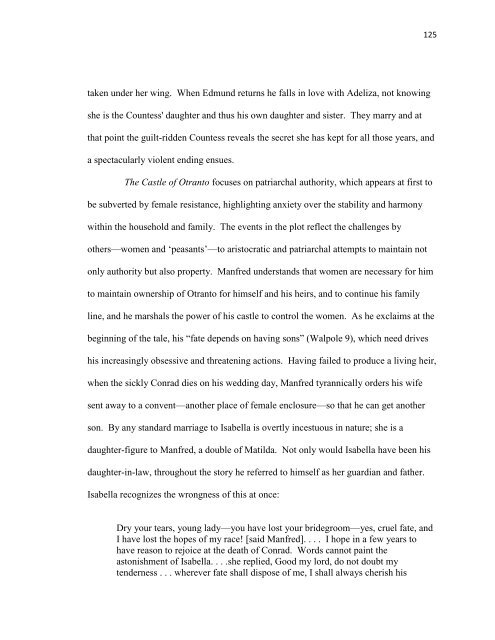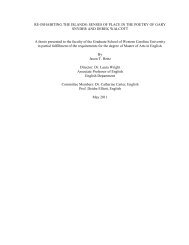SUMMERS, KAREN CRADY, Ph.D. Reading Incest - The University ...
SUMMERS, KAREN CRADY, Ph.D. Reading Incest - The University ...
SUMMERS, KAREN CRADY, Ph.D. Reading Incest - The University ...
You also want an ePaper? Increase the reach of your titles
YUMPU automatically turns print PDFs into web optimized ePapers that Google loves.
125<br />
taken under her wing. When Edmund returns he falls in love with Adeliza, not knowing<br />
she is the Countess' daughter and thus his own daughter and sister. <strong>The</strong>y marry and at<br />
that point the guilt-ridden Countess reveals the secret she has kept for all those years, and<br />
a spectacularly violent ending ensues.<br />
<strong>The</strong> Castle of Otranto focuses on patriarchal authority, which appears at first to<br />
be subverted by female resistance, highlighting anxiety over the stability and harmony<br />
within the household and family. <strong>The</strong> events in the plot reflect the challenges by<br />
others—women and ‘peasants’—to aristocratic and patriarchal attempts to maintain not<br />
only authority but also property. Manfred understands that women are necessary for him<br />
to maintain ownership of Otranto for himself and his heirs, and to continue his family<br />
line, and he marshals the power of his castle to control the women. As he exclaims at the<br />
beginning of the tale, his “fate depends on having sons” (Walpole 9), which need drives<br />
his increasingly obsessive and threatening actions. Having failed to produce a living heir,<br />
when the sickly Conrad dies on his wedding day, Manfred tyrannically orders his wife<br />
sent away to a convent—another place of female enclosure—so that he can get another<br />
son. By any standard marriage to Isabella is overtly incestuous in nature; she is a<br />
daughter-figure to Manfred, a double of Matilda. Not only would Isabella have been his<br />
daughter-in-law, throughout the story he referred to himself as her guardian and father.<br />
Isabella recognizes the wrongness of this at once:<br />
Dry your tears, young lady—you have lost your bridegroom—yes, cruel fate, and<br />
I have lost the hopes of my race! [said Manfred]. . . . I hope in a few years to<br />
have reason to rejoice at the death of Conrad. Words cannot paint the<br />
astonishment of Isabella. . . .she replied, Good my lord, do not doubt my<br />
tenderness . . . wherever fate shall dispose of me, I shall always cherish his
















